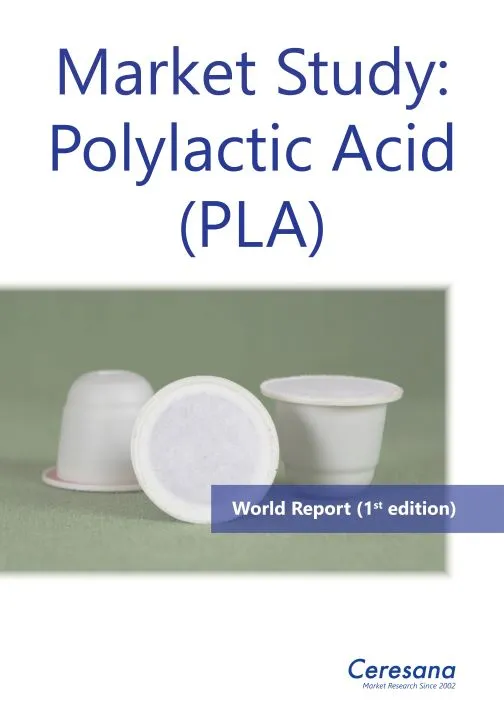Cutting-edge technology from the field : Polylactic acid, or PLA for short, is one of the most important raw materials for 3D printing but also for medical sewing thread and implants. Less spectacular but strongly growing areas of application for this bioplastic are viewing windows of bread bags and other packaging materials. The new Ceresana market study „Polylactic Acid (PLA)“ forecasts that PLA sales will reach around USD 3.7 billion worldwide by 2032.
Biobased and Biodegradable Plastics
While polylactic acid can be obtained from whey or other dairy products, PLA is usually fermented from plant starch, such as corn, sugar beets or sugar cane. PLA can be compostable or long-lasting, depending on the manufacturing process, added additives and copolymers. Like other bioplastics, PLA is benefiting from the growing popularity of renewable raw materials and government regulations on single-use products and plastic bags. Plastics manufacturers are responding to growing consumer awareness of plastic waste issues, with significant expansions in the production capacities for PLA in various countries, such as France, the USA and Thailand, but especially in China. By 2032, Ceresana expects more than two-thirds of global PLA production to take place in Asia.
Packaging: Main Application for PLA
PLA has a wide range of applications, from simple fastening clips for agriculture to cosmetic fillers. Biocompatible implants that dissolve in the human body and skin-compatible hygiene products have been areas of application where PLA has been profitable for years. Nowadays, PLA is mainly used to produce packaging, such as biodegradable films, nets, rigid containers, coated paper or foamed packaging. PLA blends are also used, among other things, to produce air cushion bags and filling material for packaging (loose fill). The packaging industry is currently the most important market for PLA, with a share of around 65%. Ceresana expects flexible packaging to grow at a rate of 15.2% per year. PLA fibers are also increasingly being used in the textile industry for yarns or upholstery. Globally, Ceresana expects the demand for PLA to quadruple over the next ten years.
Latest Industry Analysis: “Polylactic Acid (PLA)” Market Study
Chapter 1 of Ceresana’s new market study provides a comprehensive depiction and analysis of the global market for PLA – including forecasts up to 2032: the development of demand for, revenues generated with and production of polylactic acid is presented for the regions of Europe, North America, Asia-Pacific and „Rest of the World“. Additionally, the following application areas for PLA are examined individually: rigid packaging, flexible packaging (bags, sacks, and other packaging), consumer, automotive and electronics, textiles and fibers, other applications. In Chapter 2, the countries with the largest PLA sales are considered individually: Germany, France, United Kingdom, Italy, the Netherlands, Spain, the USA, China, Japan, South Korea and Taiwan. Chapter 3 provides useful company profiles of the top producers of PLA, clearly arranged by contact details, revenues, profit, product range, production sites and brief profile. Detailed profiles are supplied by 47 manufacturers, such as Evonik Industries AG, Nature Works LLC, Futerro, Bewi Synbra Technology, Total Corbion, and Danimer Scientific LLC. Further Information About the Latest Market Study “Polylactic Acid” (PLA): https://ceresana.com/en/produkt/polylactic-acid-market-report

About Ceresana
As one of the world’s leading market research institutes, Ceresana specializes in the chemicals, plastics, packaging, and industrial goods sectors. Special focus areas are bio-economy and automotive / mobility. Since 2002, companies have benefited from high-quality industry analyses and forecasts. Over 250 market studies provide more than 10,000 clients around the world with the knowledge base for sustainable success. More about Ceresana at www.ceresana.com
Ceresana
Mainaustrasse 34
78464 Konstanz
Germany
Press Contact: Martin Ebner, m.ebner@ceresana.com
